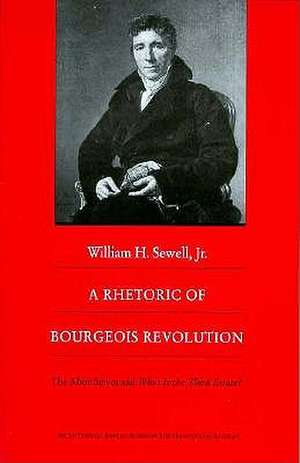A Rhetoric of Bourgeois Revolution – The Abbe Sieyes and What is the Third Estate?: Bicentennial Reflections on the French Revolution
Autor William H. Sewellen Limba Engleză Paperback – 4 dec 1994
This book studies the powerful rhetoric of the great pamphlet and the brilliant but enigmatic thought of its author. William H. Sewell's insightful analysis reveals the fundamental role played by the new discourse of political economy in Sieyes's thought and uncovers the strategies by which this gifted rhetorician gained the assent of his intended readers--educated and prosperous bourgeois who felt excluded by the nobility in the hierarchical social order of the old regime. He also probes the contradictions and incoherencies of the pamphlet's highly polished text to reveal fissures that reach to the core of Sieyes's thought--and to the core of the revolutionary project itself.
Combining techniques of intellectual history and literary analysis with a deep understanding of French social and political history, Sewell not only fashions an illuminating portrait of a crucial political document, but outlines a fresh perspective on the history of revolutionary political culture.
Preț: 241.29 lei
Nou
Puncte Express: 362
Preț estimativ în valută:
46.17€ • 48.33$ • 38.43£
46.17€ • 48.33$ • 38.43£
Carte tipărită la comandă
Livrare economică 31 martie-14 aprilie
Preluare comenzi: 021 569.72.76
Specificații
ISBN-13: 9780822315384
ISBN-10: 0822315386
Pagini: 248
Dimensiuni: 150 x 250 x 15 mm
Greutate: 0.41 kg
Ediția:New.
Editura: MD – Duke University Press
Seria Bicentennial Reflections on the French Revolution
ISBN-10: 0822315386
Pagini: 248
Dimensiuni: 150 x 250 x 15 mm
Greutate: 0.41 kg
Ediția:New.
Editura: MD – Duke University Press
Seria Bicentennial Reflections on the French Revolution
Notă biografică
Textul de pe ultima copertă
"In this remarkable analysis, William Sewell restores to Sieyes's great text a complexity that has too often been denied it. Drawing on contemporary political theory and political economy as well as historical and biographical material, Sewell masterfully demonstrates that what matters about Sieyes's text is not only its acknowledged influence on the events of the French Revolution, but also the ways in which contemporaries misunderstood or rejected its deeper, prophetic vision."--Sarah Maza, Northwestern University













